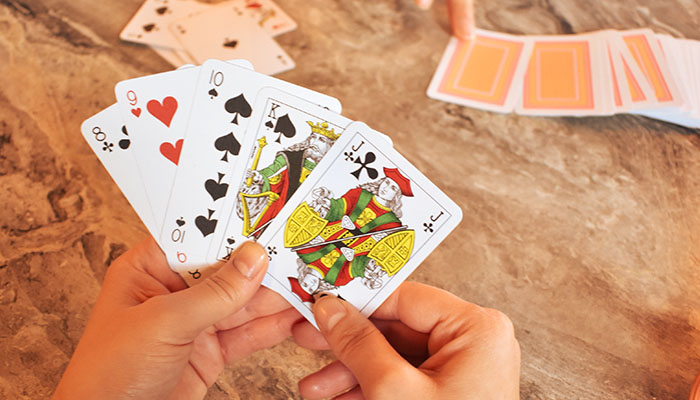The Complete BS Card Game Rules Handbook for Beginners and Pros (Personals - Other Personals Ads)

UKAdsList > Personals > Other Personals Ads
Item ID 9713818 in Category: Personals - Other Personals Ads
The Complete BS Card Game Rules Handbook for Beginners and Pros | |
Free Online Advertising Free Internet Web Site Advertising. UK Free Classifieds United Kingdom Free Ads Website. 100% Free Ad Posting. Canada Free Ads Popular Online Classifieds in Canada. No Sign up, No Email Required to Post. BS (also known as “Cheat,” “I Doubt It,” or “Bluff”) is a classic shedding-type card game that combines luck, psychology, and strategy. Whether you’re playing at family gatherings or in competitive game nights, this handbook covers everything from the fundamental rules to advanced tactics—empowering both newcomers and seasoned players to enjoy and master BS. 1. Game Overview Objective: Be the first player to discard all your cards. Players: Ideal for 3–6 participants. More players increase bluff complexity. Deck: Standard 52-card deck. Jokers are typically removed, but you can include them as wildcards if desired. 2. Setup Shuffle and Deal: Shuffle thoroughly. Deal all cards one at a time, clockwise. Some players may have one extra card; that’s fine. Determine Starting Player: The dealer may start, or choose the player to the dealer’s left. Establish Seating: Arrange seating so play proceeds clockwise and all players can see the central pile and each other. 3. Core Rules 3.1 Rank Sequence Cards cycle in ascending order: Ace → 2 → 3 → … → King → back to Ace. 3.2 Playing Cards On your turn, place one or more cards face-down onto the central pile. Announce the rank you claim (truthfully or as a bluff). Example: “two 7s.” 3.3 Challenging a Play (“BS!” Call) Any player (before the next turn) may shout “BS!” to challenge the last declaration. If the bluffer lied: They pick up the entire discard pile. If the bluffer told the truth: The challenger picks up the pile. After resolution, the next rank to be played resets based on who lost the challenge: If the bluffer lost, play continues with the challenger declaring the next rank. If the challenger lost, play continues with the bluffer declaring the next rank. 3.4 Winning the Game The first player to successfully discard all their cards wins immediately. Optionally, play on to determine second, third place, etc. 4. Beginner Strategies Play Honest Early Hands: Build a reputation for truth-telling to make future bluffs more believable. Small-Scale Bluffs: Bluff with one or two cards so that picking up the pile (if caught) doesn’t set you too far back. Observe Opponents: Watch for physical tells—hesitation, voice changes, or fidgeting often signal a bluff. Keep Track of Ranks: Mentally note which ranks have been declared to spot impossible claims (e.g., a fifth Ace). 5. Intermediate Tactics Card Counting: Track how many of each rank have been played to detect unlikely declarations. Positional Play: Early Position: Play tighter; fewer players have acted so surprises are riskier. Late Position: You have more information—use this to bluff when opponents seem hesitant. Betting the Pace: Vary the speed of your play. A sudden rapid announcement or a deliberate pause can mislead observers. 6. Pro-Level Techniques Credibility Management: Truth Bank: Accumulate several truthful plays early to “deposit” credibility you can later “withdraw” with big bluffs. Selective Honesty: In high-suspicion moments, tell the truth to catch opponents off-guard. Advanced Bluff Timing: Bluff when the discard pile is small (minimal risk) or when opponents have large hands (less likely to challenge). Psychological Warfare: Use reverse psychology—occasionally play ridiculously honest in obviously suspicious situations to make challengers second-guess themselves. Feign confidence or nervousness strategically to sell your story. 7. Popular Variations Joker Wild: Include jokers as wildcards that can represent any rank—intensifies bluff complexity. Multi-Deck Chaos: Use two decks for larger groups; tracking cards becomes more challenging. Team Play: Partner up in pairs—teammates coordinate signals or cover each other’s plays. Reverse Play: Mid-game, switch the rank sequence direction (King → Queen → … → Ace). 8. Common Pitfalls Over-Bluffing: Constant lying destroys your credibility, making opponents challenge all your plays. Emotional Challenges: Resist calling “BS!” out of frustration—being wrong forces you to take the entire pile. Ignoring Table Dynamics: Adapt your strategy to the playing styles and tendencies at your specific table. Conclusion Mastering BS requires more than just good cards—it demands psychological insight, strategic timing, and disciplined gameplay. Beginners should focus on understanding the flow, building trust, and making small bluffs. Intermediate players can leverage card counting and positional awareness. Pros refine credibility banks, perfect their timing, and wield advanced psychological tactics. With this comprehensive handbook, you’re equipped to play BS confidently—whether you’re just learning or aiming to dominate every game night. Good luck, and may your bluffs go unchallenged!  | |
| Related Link: Click here to visit item owner's website (0 hit) | |
| Target Nation: All Nations Target City : All Cities Last Update : 12 May 2025 10:15 AM Number of Views: 73 | Item Owner : Chriselle Contact Email: (None) Contact Phone: (None) |
| Friendly reminder: Click here to read some tips. | |
UKAdsList > Personals > Other Personals Ads
© 2025 UKAdsList.com
USNetAds.com | GetJob.us | CANetAds.com | AUNetAds.com | INNetAds.com | CNNetAds.com | Hot-Web-Ads.com | USAOnlineClassifieds.com
2025-10-14 (0.222 sec)